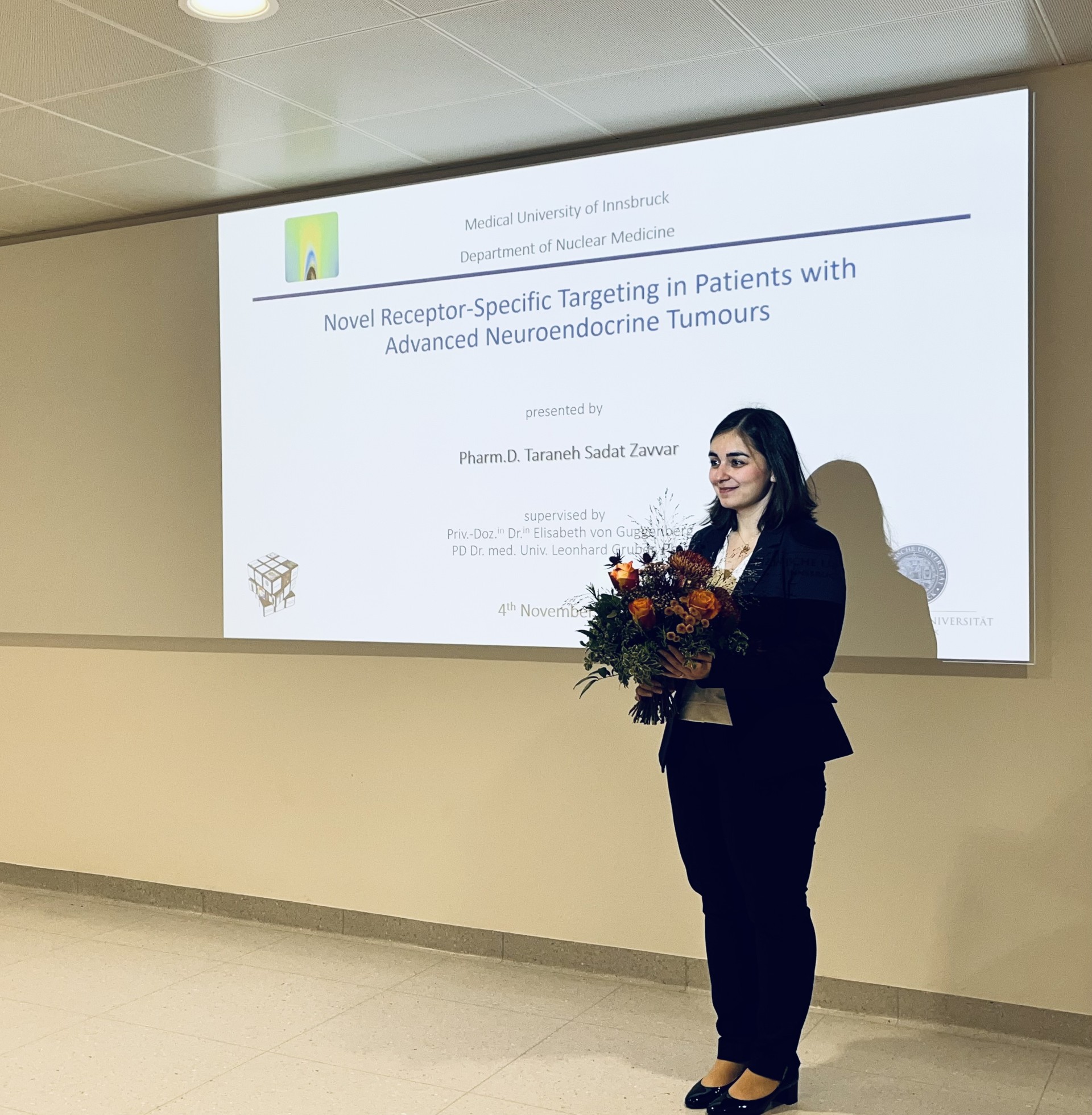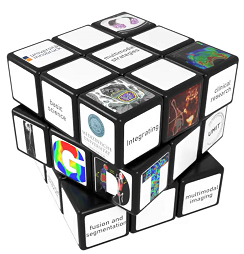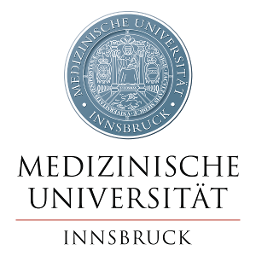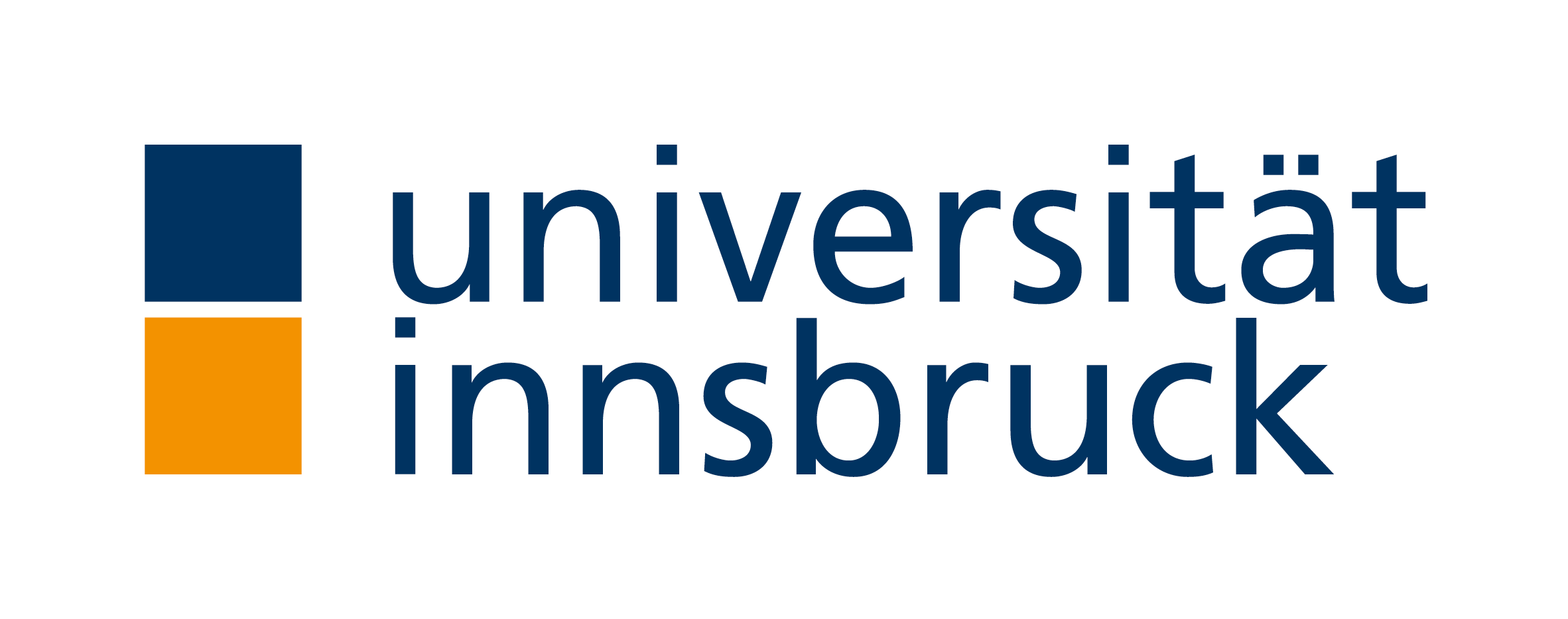 We congratulate Taraneh Zavvar, who successfully defended her dissertation on 4 November 2025. Her doctoral thesis, entitled “Novel Receptor-Specific Targeting in Patients with Advanced Neuroendocrine Tumours”, deals with the development and clinical translation of a new radiolabelled ligand for therapeutic application in peptide receptor radionuclide therapy (PRRT). In her doctoral thesis, Taraneh was able to select [177Lu]Lu-DOTA-MGS5 for clinical translation from a pool of various minigastrin analogues with specific binding to the cholecystokinin-2 receptor. In addition to the comprehensive characterisation of the 177Lu-labelled peptide in preclinical studies, with the development of a standardised pharmaceutical formulation Taraneh made a significant contribution in bringing the new radiopharmaceutical closer to clinical application. In a collaboration between the Medical University of Innsbruck and the industry partner Evergreen Theragnostics in the USA, this new personalised therapy is currently being investigated in a first clinical trial in patients with small cell lung cancer. Taraneh conducted her research in the Radiopharmaceutical Laboratory of the Department of Nuclear Medicine, with Priv.-Doz. Dr. Elisabeth von Guggenberg as her supervisor and Priv.-Doz. Dr. Leonhard Gruber as her co-supervisor. The project was funded by the Medical University as part of the PhD programme “IGDT – integrating multimodal strategies for clinical research” (FWF DOC 110 doc.funds; grant DOI 10.55776/DOC110). Tareneh will continue to work as a postdoctoral researcher at the Department of Nuclear Medicine and contribute her expertise to the FWF project P34732 “Innovative radiolabelling strategies for CCK2R targeting”. The IGDT Faculty is delighted to congratulate Taraneh on completing her PhD studies!
We congratulate Taraneh Zavvar, who successfully defended her dissertation on 4 November 2025. Her doctoral thesis, entitled “Novel Receptor-Specific Targeting in Patients with Advanced Neuroendocrine Tumours”, deals with the development and clinical translation of a new radiolabelled ligand for therapeutic application in peptide receptor radionuclide therapy (PRRT). In her doctoral thesis, Taraneh was able to select [177Lu]Lu-DOTA-MGS5 for clinical translation from a pool of various minigastrin analogues with specific binding to the cholecystokinin-2 receptor. In addition to the comprehensive characterisation of the 177Lu-labelled peptide in preclinical studies, with the development of a standardised pharmaceutical formulation Taraneh made a significant contribution in bringing the new radiopharmaceutical closer to clinical application. In a collaboration between the Medical University of Innsbruck and the industry partner Evergreen Theragnostics in the USA, this new personalised therapy is currently being investigated in a first clinical trial in patients with small cell lung cancer. Taraneh conducted her research in the Radiopharmaceutical Laboratory of the Department of Nuclear Medicine, with Priv.-Doz. Dr. Elisabeth von Guggenberg as her supervisor and Priv.-Doz. Dr. Leonhard Gruber as her co-supervisor. The project was funded by the Medical University as part of the PhD programme “IGDT – integrating multimodal strategies for clinical research” (FWF DOC 110 doc.funds; grant DOI 10.55776/DOC110). Tareneh will continue to work as a postdoctoral researcher at the Department of Nuclear Medicine and contribute her expertise to the FWF project P34732 “Innovative radiolabelling strategies for CCK2R targeting”. The IGDT Faculty is delighted to congratulate Taraneh on completing her PhD studies!

The newly designed, internationally oriented DocFunds programme “image guided diagnosis and therapy (IGDT) – integrating multimodal strategies for clinical research” qualifies young scientists with both medical and basic science background in the highly interdisciplinary and rapidly evolving field of digital medical imaging and image guided therapies. The multi- and interdisciplinary research programme integrates innovative aspects in applied mathematics, biomedical physics, computer science, clinical imaging and therapy. The programme combines training in basic science, translational and clinical science. The already existing PhD programme (Image-guided Diagnosis and Therapy (i-med.ac.at) provides a solid basis for the new programme.
The planned PhD projects are designed to improve image guided diagnosis and therapies and, therefore, patient care. The curriculum offers lectures and courses in basic and medical sciences in order to improve the mutual understanding of medical and basic scientists. Each PhD student is, therefore, supervised by a medical and a basic scientist. Scientists with a background in medical and basic sciences are in high demand, because innovative imaging and interventional procedures are increasingly important. This programme supports the education of next-generation scientists with excellent career opportunities in science, patient care and industry.
It is a joint initiative of the Medical University Innsbruck (MUI), the Leopold-Franzens-University Innsbruck (LFUI) and until summer 2024 the „Private Universität für Medizinische Informatik und Technik“ (UMIT).
Coordinator: Elke R. Gizewski (University Hospital of Radiology – Wissenschaft – Forschung (tirol-kliniken.at)) Deputy Coordinator: Clemens Decristoforo (Clemens Decristoforo (i-med.ac.at))
Partners:
until summer 2024 UMIT was one of our partners




